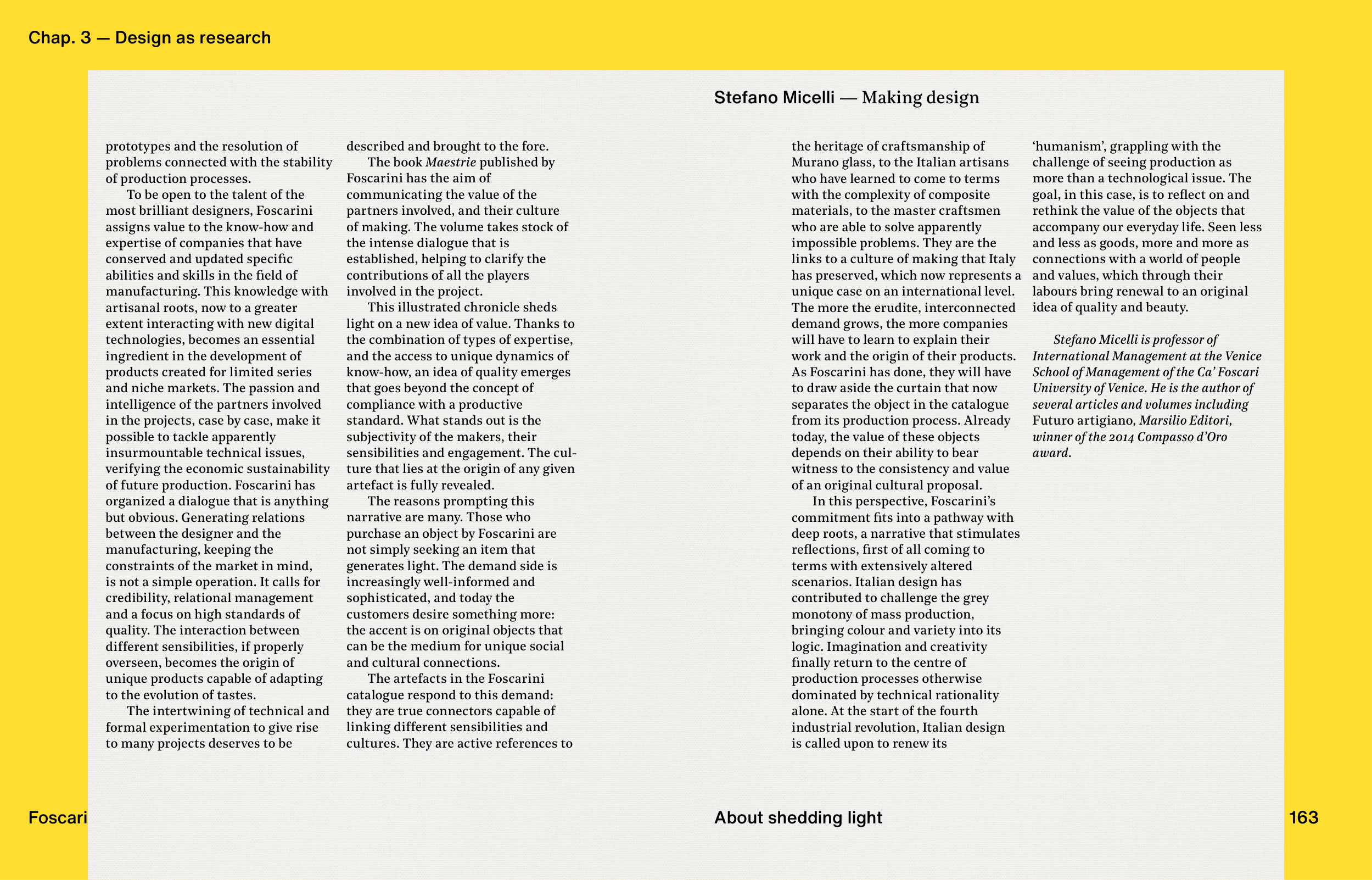163
Foscarini
prototypes and the resolution of
problems connected with the stability
of production processes.
To be open to the talent of the
most brilliant designers, Foscarini
assigns value to the know-how and
expertise of companies that have
conserved and updated specifi c
abilities and skills in the fi eld of
manufacturing. This knowledge with
artisanal roots, now to a greater
extent interacting with new digital
technologies, becomes an essential
ingredient in the development of
products created for limited series
and niche markets. The passion and
intelligence of the partners involved
in the projects, case by case, make it
possible to tackle apparently
insurmountable technical issues,
verifying the economic sustainability
of future production. Foscarini has
organized a dialogue that is anything
but obvious. Generating relations
between the designer and the
manufacturing, keeping the
constraints of the market in mind,
is not a simple operation. It calls for
credibility, relational management
and a focus on high standards of
quality. The interaction between
different sensibilities, if properly
overseen, becomes the origin of
unique products capable of adapting
to the evolution of tastes.
The intertwining of technical and
formal experimentation to give rise
to many projects deserves to be
described and brought to the fore.
The book Maestrie published by
Foscarini has the aim of
communicating the value of the
partners involved, and their culture
of making. The volume takes stock of
the intense dialogue that is
established, helping to clarify the
contributions of all the players
involved in the project.
This illustrated chronicle sheds
light on a new idea of value. Thanks to
the combination of types of expertise,
and the access to unique dynamics of
know-how, an idea of quality emerges
that goes beyond the concept of
compliance with a productive
standard. What stands out is the
subjectivity of the makers, their
sensibilities and engagement. The cul-
ture that lies at the origin of any given
artefact is fully revealed.
The reasons prompting this
narrative are many. Those who
purchase an object by Foscarini are
not simply seeking an item that
generates light. The demand side is
increasingly well-informed and
sophisticated, and today the
customers desire something more:
the accent is on original objects that
can be the medium for unique social
and cultural connections.
The artefacts in the Foscarini
catalogue respond to this demand:
they are true connectors capable of
linking different sensibilities and
cultures. They are active references to
Chap. 3 — Design as research
About shedding light
the heritage of craftsmanship of
Murano glass, to the Italian artisans
who have learned to come to terms
with the complexity of composite
materials, to the master craftsmen
who are able to solve apparently
impossible problems. They are the
links to a culture of making that Italy
has preserved, which now represents a
unique case on an international level.
The more the erudite, interconnected
demand grows, the more companies
will have to learn to explain their
work and the origin of their products.
As Foscarini has done, they will have
to draw aside the curtain that now
separates the object in the catalogue
from its production process. Already
today, the value of these objects
depends on their ability to bear
witness to the consistency and value
of an original cultural proposal.
In this perspective, Foscarini’s
commitment fi ts into a pathway with
deep roots, a narrative that stimulates
refl ections, fi rst of all coming to
terms with extensively altered
scenarios. Italian design has
contributed to challenge the grey
monotony of mass production,
bringing colour and variety into its
logic. Imagination and creativity
fi nally return to the centre of
production processes otherwise
dominated by technical rationality
alone. At the start of the fourth
industrial revolution, Italian design
is called upon to renew its
‘humanism’, grappling with the
challenge of seeing production as
more than a technological issue. The
goal, in this case, is to refl ect on and
rethink the value of the objects that
accompany our everyday life. Seen less
and less as goods, more and more as
connections with a world of people
and values, which through their
labours bring renewal to an original
idea of quality and beauty.
Stefano Micelli is professor of
International Management at the Venice
School of Management of the Ca’ Foscari
University of Venice. He is the author of
several articles and volumes including
Futuro artigiano, Marsilio Editori,
winner of the 2014 Compasso d’Oro
award.
Stefano Micelli — Making design
163


